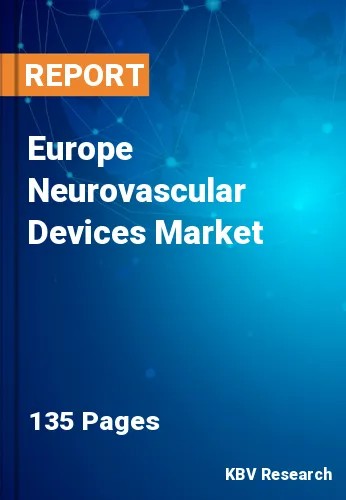The Europe Neurovascular Devices Market would witness market growth of 8.1% CAGR during the forecast period (2022-2028).
The burden of neurovascular disorders is being lessened because of technological advancements in healthcare. Various materials, including cobalt, nitinol, and platinum, can be used in neurovascular devices to provide specific properties for aneurysm repair and ischemic stroke prevention. The development of neurovascular devices and their rising popularity result from increased government investment in developing sophisticated healthcare infrastructure and enhanced participation in research and development initiatives.
By enabling improved treatments for various neurological disorders, the availability of technologically advanced neurovascular devices has significantly contributed to the market expansion. The main variables influencing the market for neurovascular devices include rising obesity rates, an aging population, and technical developments in interventional neurology.
Moreover, the aneurysm coiling & embolization devices are anticipated to witness significant demand which can be attributed to the expanding market supply of embolic coils for neurovascular treatment and the rising end-user interest in minimally invasive neurosurgery procedures. Neurological conditions such as strokes, brain aneurysms, and arteriovenous malformations (AVMs) are rising. Moreover, healthcare spending and R&D funding are rising, which are all driving the development of the neurovascular device market.
The Census results for 2021 show that the population of England & Wales has continued to age and that there are now more individuals than ever before across older age groups. Compared to 16.4% at the time of the previous census in 2011, almost 11 million persons, or 18.6% of the total population, were 65 or older. This includes 527,900 persons, or more than half a million, who were at least 90 years old. The region's market participants may have investment opportunities due to the increased risk of neurovascular illnesses brought on by the aging population.
The Germany market dominated the Europe Neurovascular Devices Market by Country in 2021, and would continue to be a dominant market till 2028; thereby, achieving a market value of $273.2 million by 2028. The UK market is anticipated to grow at a CAGR of 7.2% during (2022 - 2028). Additionally, The France market would exhibit a CAGR of 8.9% during (2022 - 2028).
Based on End User, the market is segmented into Hospital & Surgery Centers, Ambulatory Care Centers and Research laboratories & Academic Institutes. Based on Technology, the market is segmented into Embolization & Coiling (Embolic Coils, Flow Diversion Devices and Liquid Embolic Agents), Neurothrombectomy Devices (Clot Retrievers, Suction & Aspiration Devices, and Snares), Cerebral Balloon Angioplasty & Stenting Systems (Carotid Artery Stents and Embolic Protection Systems), and Support Devices (Microcatheters and Microguidewires). Based on Disease Pathology, the market is segmented into Cerebral Aneuryms, Ischemic Strokes, Cartoid Artery Stenosis, Arteriovenous Malformation & Fistulas (AVM) and Others. Based on countries, the market is segmented into Germany, UK, France, Russia, Spain, Italy, and Rest of Europe.
Free Valuable Insights: The Global Neurovascular Devices Market will Hit $4.2 Billion by 2028, at a CAGR of 8.8%
The market research report covers the analysis of key stake holders of the market. Key companies profiled in the report include Abbott Laboratories, Medtronic PLC, Stryker Corporation, Johnson & Johnson, Terumo Corporation, Merit Medical Systems, Inc., MicroPort Scientific Corporation, Medikit Co. Ltd., and W. L. Gore & Associates, Inc.
By End User
By Technology
By Disease Pathology
By Country
Our team of dedicated experts can provide you with attractive expansion opportunities for your business.

